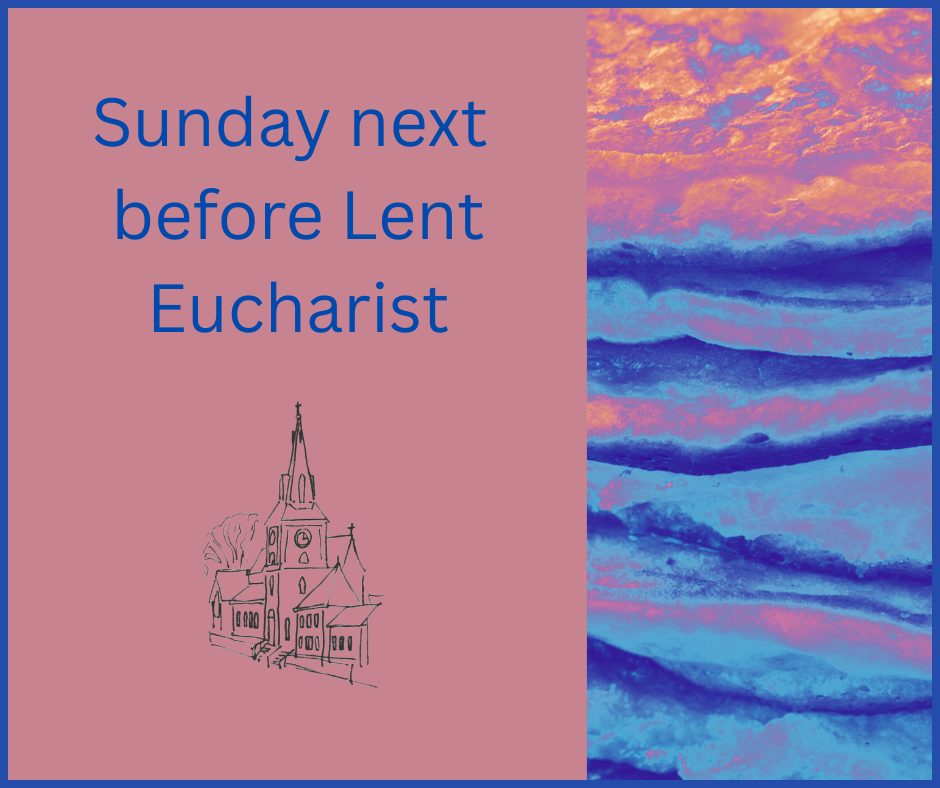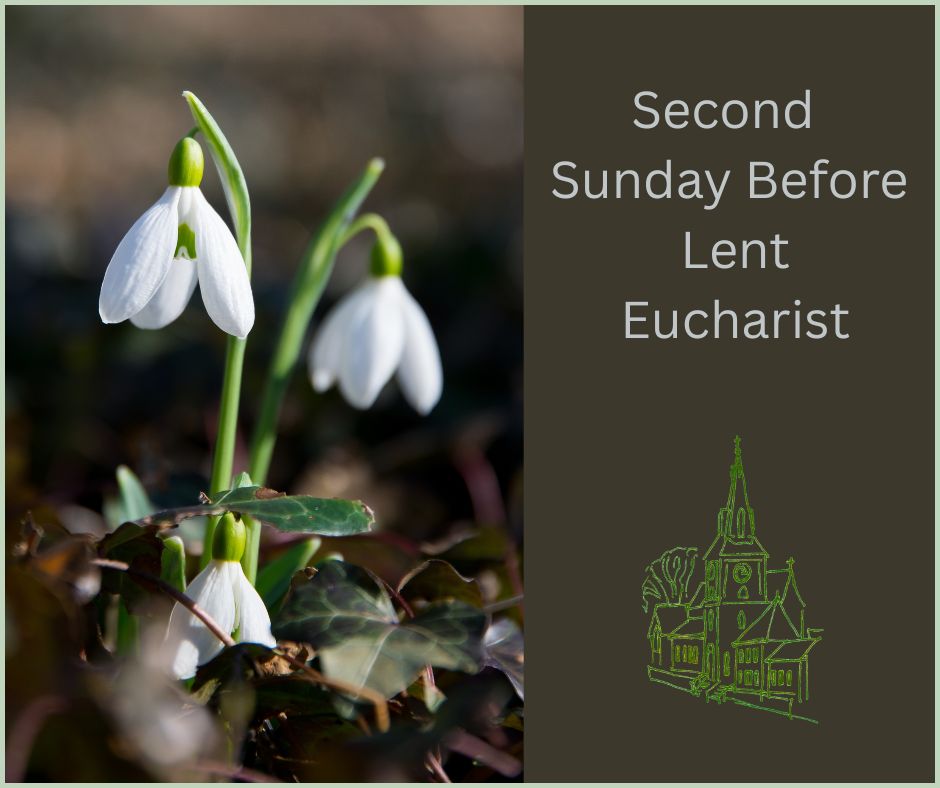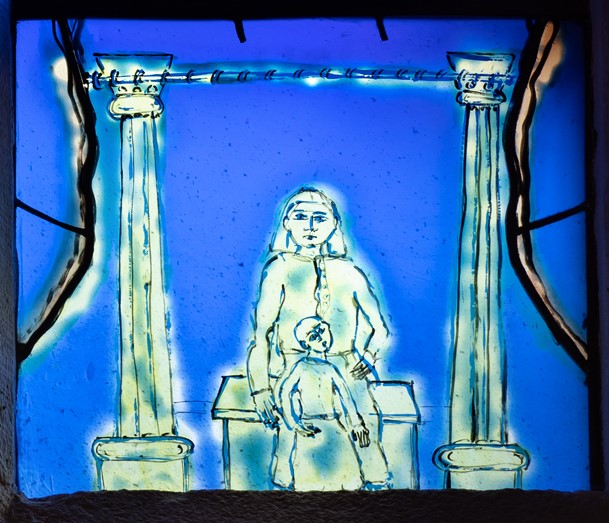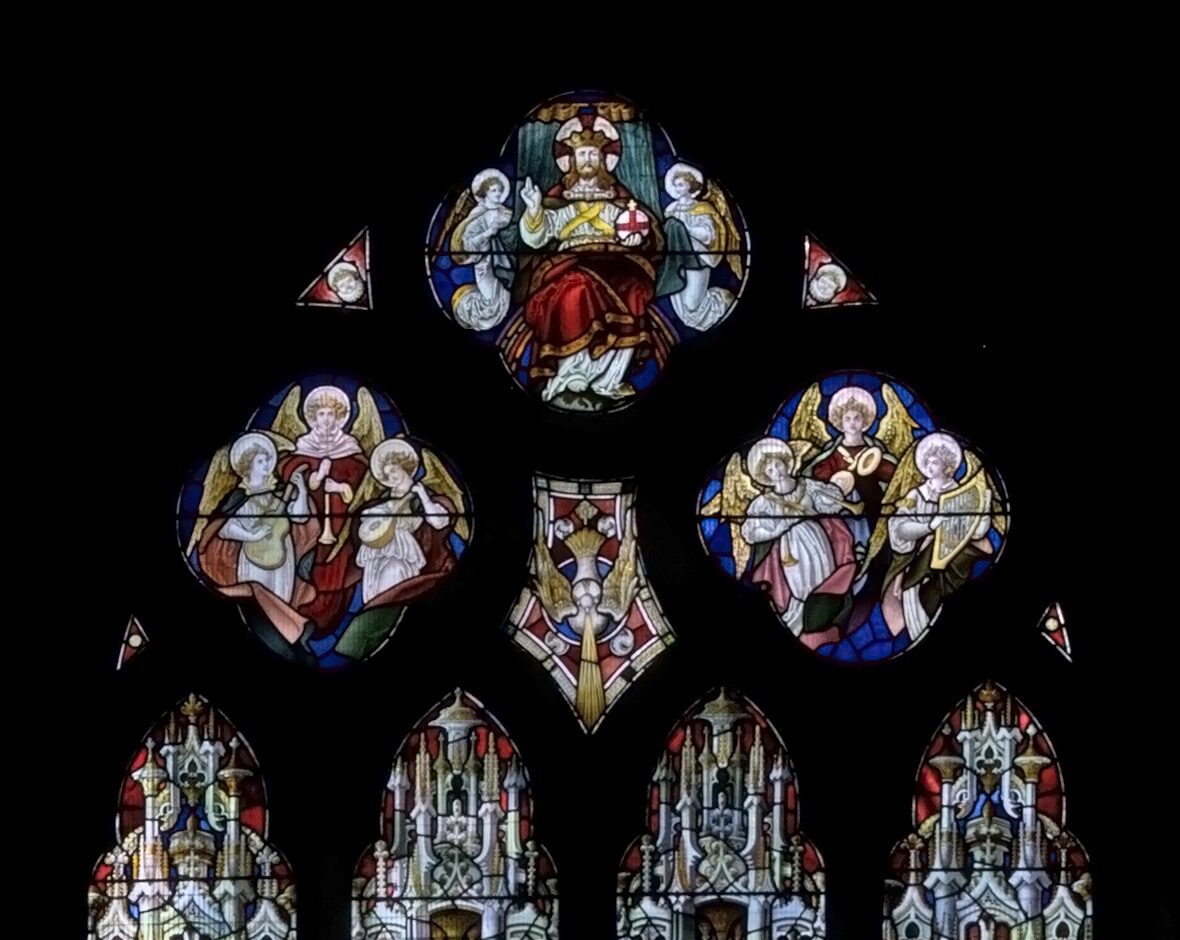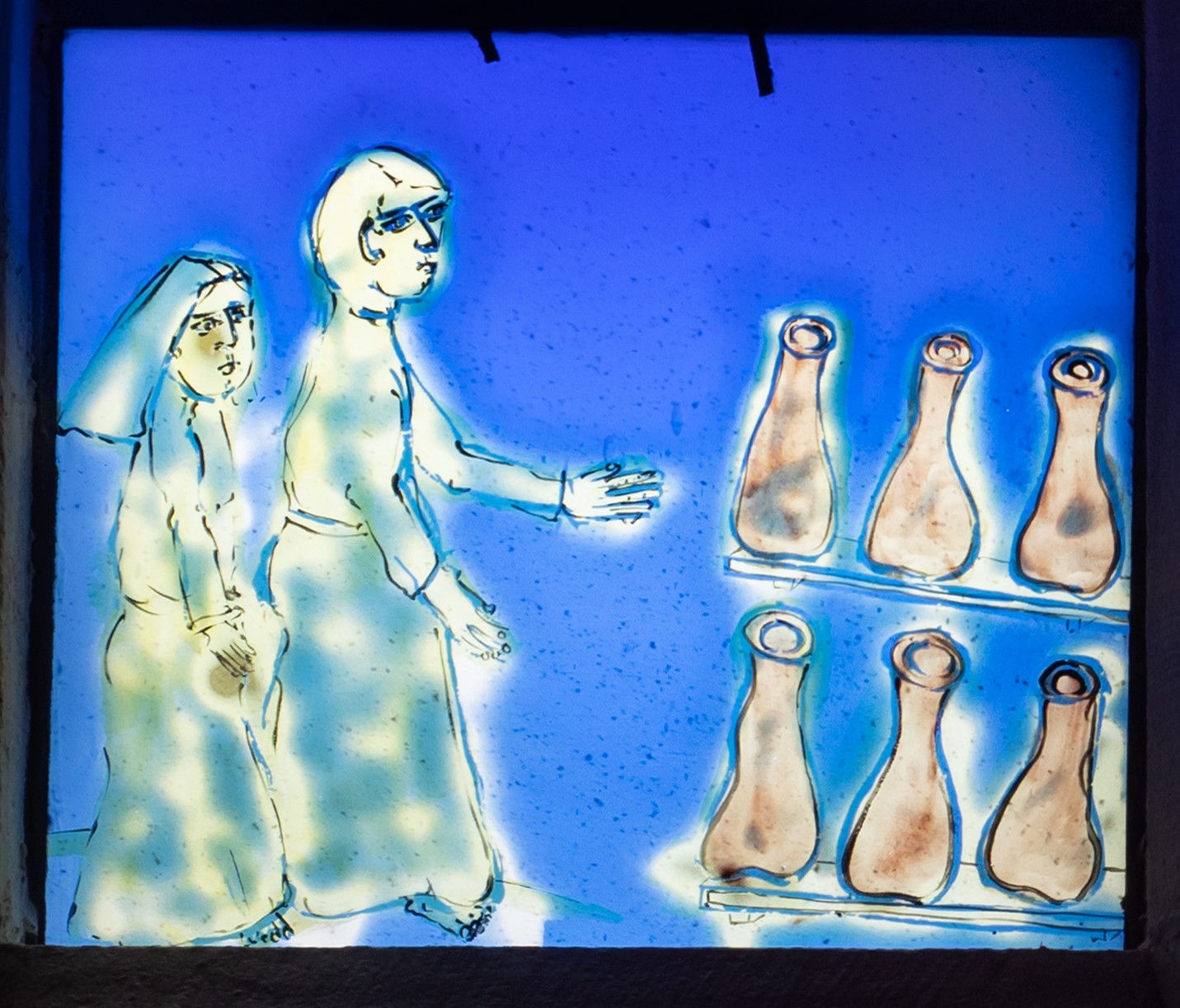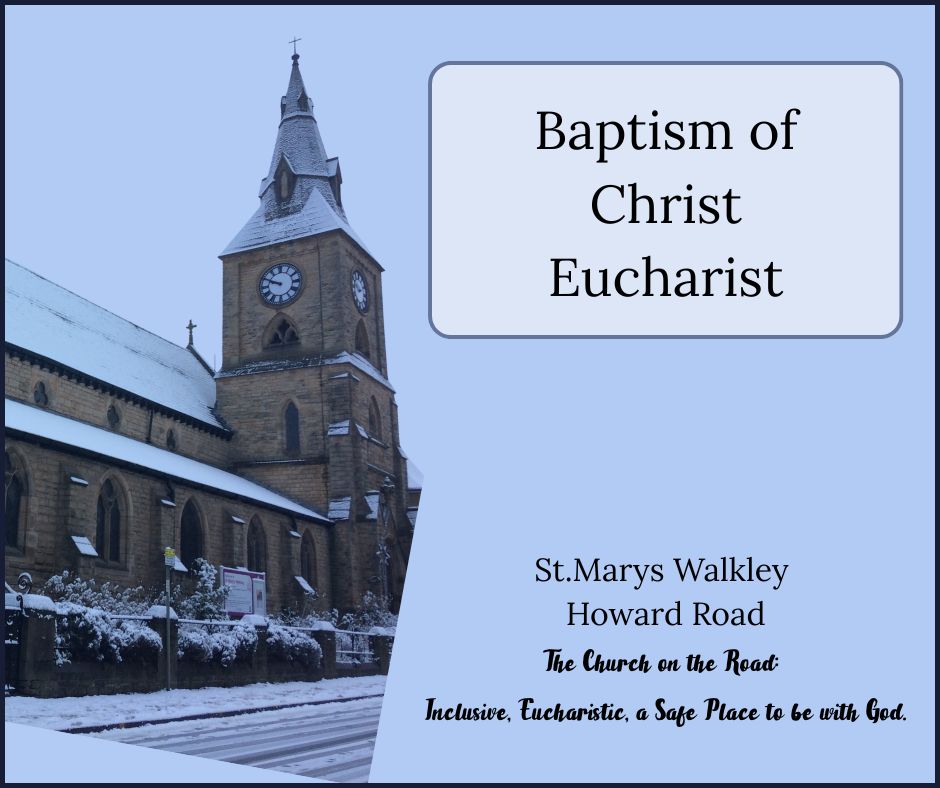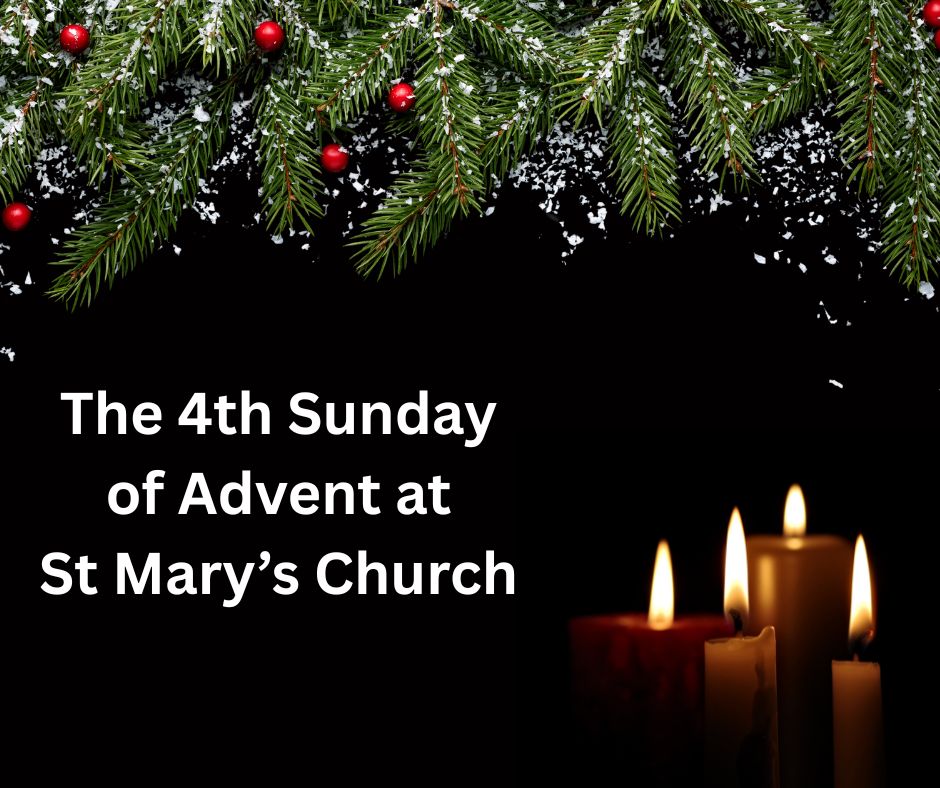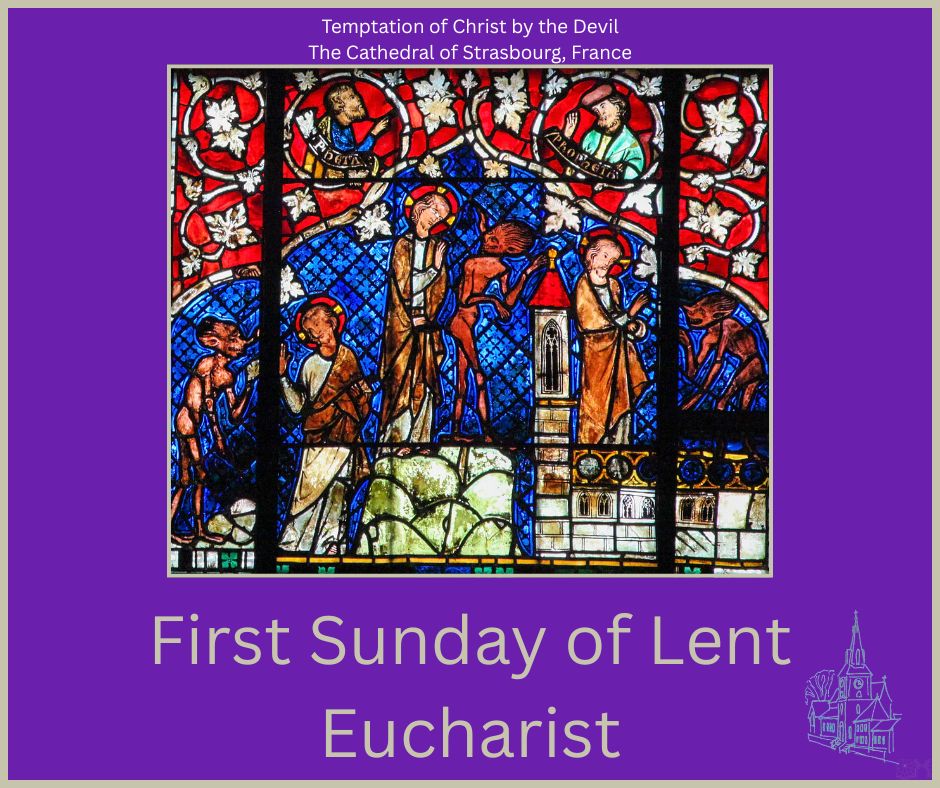
Watch this week's service on YouTube
Download the order of service here -26 02 22 The First Sunday of Lent Eucharist
Read this week's Church News
The Readings.
Romans 5.12-19
Therefore, just as sin came into the world through one man, and death came through sin, and so death spread to all because all have sinned— sin was indeed in the world before the law, but sin is not reckoned when there is no law. Yet death exercised dominion from Adam to Moses, even over those whose sins were not like the transgression of Adam, who is a type of the one who was to come.
But the free gift is not like the trespass. For if the many died through the one man’s trespass, much more surely have the grace of God and the free gift in the grace of the one man, Jesus Christ, abounded for the many. And the free gift is not like the effect of the one man’s sin. For the judgement following one trespass brought condemnation, but the free gift following many trespasses brings justification. If, because of the one man’s trespass, death exercised dominion through that one, much more surely will those who receive the abundance of grace and the free gift of righteousness exercise dominion in life through the one man, Jesus Christ.
Therefore just as one man’s trespass led to condemnation for all, so one man’s act of righteousness leads to justification and life for all. For just as by the one man’s disobedience the many were made sinners, so by the one man’s obedience the many will be made righteous.
Matthew 4.1-11
Then Jesus was led up by the Spirit into the wilderness to be tempted by the devil. He fasted for forty days and forty nights, and afterwards he was famished. The tempter came and said to him, ‘If you are the Son of God, command these stones to become loaves of bread.’ But he answered, ‘It is written,
“One does not live by bread alone,
but by every word that comes from the mouth of God.” ’
Then the devil took him to the holy city and placed him on the pinnacle of the temple, saying to him, ‘If you are the Son of God, throw yourself down; for it is written,
“He will command his angels concerning you”,
and “On their hands they will bear you up,
so that you will not dash your foot against a stone.” ’
Jesus said to him, ‘Again it is written, “Do not put the Lord your God to the test.” ’
Again, the devil took him to a very high mountain and showed him all the kingdoms of the world and their splendour; and he said to him, ‘All these I will give you, if you will fall down and worship me.’ Jesus said to him, ‘Away with you, Satan! for it is written,
“Worship the Lord your God,
and serve only him.” ’
Then the devil left him, and suddenly angels came and waited on him.
The Sermon
Prepared by Kath, Reader at St Mary's.
I can hardly believe it but here we are at the start of Lent already; a period when traditionally many Christians decide to abstain from something they like or enjoy, focus more on their prayer life and/ or give more for the benefit of others be that with money or time or in other ways, or perhaps even a combination of all three of these elements. Very unusually, Lent this year coincides with Ramadan so our Muslim friends and neighbours are doing much the same things. Even many non-religious people use Lent as a prompt to give something up either to improve their health or test their willpower. This notion of serious self control brings us very neatly to the theme of our reading from Matthew’s gospel, namely temptation. Always an interesting subject!
The reading is one that many of us will be familiar with but I wonder, when you’re reading it to yourself, what tone of voice do you imagine the devil using in this exchange with Jesus? Is he assertive or commanding, insisting that Jesus answer him or is he quietly sussing him out? Maybe he already knows the answers he’s likely to get and he’s even amusing himself by toying with a starving and exhausted man. Some cruel people do enjoy seeing the suffering of others. I don’t know why but I tend towards this latter interpretation of what he’s doing. “If you are the Son of God” in other words, prove it, let’s see what you’re made of.
The devil’s first test is pretty basic. As we are told in the passage, Jesus has fasted for forty days and nights and he is “famished”. We’re so used to hearing the information quoted in this reading that perhaps it doesn’t have the impact it should. Just think about it for a moment. That’s a very long time to go without food and no doubt Jesus would not be in a good state. And here is the devil saying “If you are the Son of God” you can satisfy your need for food so easily by turning these stones into bread and proving yourself into the bargain. Did he actually wonder if Jesus would be so easily bought? And what would it have said about Jesus if he had done so?
The devil’s second attempt to test Jesus is more serious. He’s trying to get him to test his Father’s love and value for him. Placing him on top of the highest point of the temple he’s saying “If you are the Son of God” he won’t let you get even slightly hurt if you throw yourself off and that will really prove that you are who you say you are. Again try to imagine the scene. I don’t know how you are with heights but I’d be absolutely terrified. But Jesus simply answers him “It is written, Do not put the Lord your God to the test”. Whatever our circumstances, that is something we all have to bear in mind. We shouldn’t expect God to jump through hoops to satisfy our need for certainty.
The Devil’s third attempt is perhaps more subtle. He takes Jesus to a high mountain and shows him “all the kingdoms of the world and their splendour” and says he will give them all to him if he will fall down and worship him. This sounds very much like an appeal to human desires for wealth, status and power.
Any of these tests or offers could tempt most human beings but Jesus isn’t just a human being. Even so, he chooses to trust in His Father as to who and what he is and chooses not to give in to the temptation in order to demonstrably prove it to himself or to anyone else. How does Jesus feel after the encounter is over? Is the human part of him relieved that he passed the test? When the devil is sent away I wonder, is he angry, put out, frustrated, or is he intrigued? “Who is this I’m dealing with?”
As human beings we often have to deal with temptation and there’s an awful lot of it around in our world these days. Depending on our circumstances at any given time it can be easier or harder to resist, even when we know we should. From food that isn’t good for us to situations that are morally questionable or even legally perilous we need to be aware of what we are doing and the possible consequences of giving in to temptation. The devil doesn’t always show up in an easily recognisable form. People can be compromised by accepting seemingly inocuous gifts or favours that are later used to manipulate them, gradually drawing them into doing things they would not under normal circumstances have chosen to do. They can find themselves hooked on whatever they are receiving or trapped by a desire to not be found out. I’m sure we all know how the tentacles of corruption work.
In the news for some time now we have been seeing a lot of chickens coming home to roost, so to speak. Some people who, knowingly or unwittingly were tempted by their desire for luxuries, wealth, drugs, improper relationships, status, power and influence without questioning or caring where these things came from, are now having their, careers, reputations and lives wrecked and bringing others down with them. Some of them probably assumed that they would never be held accountable for their deeds because of who and what they are. Others will be deeply regretting ever meeting those who lured them into the mess they now find themselves in. Was it worth the very high price they are now paying? Did they ever stop to think or care about those who have suffered because of their choices? Do they take responsibility for their actions or do they put all the blame on others?
The people we are seeing in the news may seem very far removed from the lives we lead. We don’t move in the kind of circles that they do so we may feel safe from what is happening to them. But none of us are immune from temptation, even Jesus. The passage in Matthew’s gospel specifically states that the Spirit took him into the wilderness to be tempted. So we can know that our struggles to deal with temptation are understood. From his responses to the temptations set before him Jesus shows us how to see them for what they really are and how we can lean on our beliefs and God given values and stand strong when it matters.
At first I thought this was pretty much where my sermon would end. I’d put my iPad away thinking, well that’s the first draft written, bar a little fine tuning. But later I couldn’t help feeling that it was a bit of a somber and downbeat place to end. More was needed. I couldn’t help thinking it would be nice to be able to preach a sermon that was all sunshine and roses and uplifting but sadly that wouldn’t be a very honest reflection of how life is for many people throughout the world at the moment. Then I listened to someone talking about the Revd. Jesse Jackson who had just died. I think we would all agree that he was a very great and inspiring man. But he was nearly always dealing with incredibly difficult situations, some of which seemed intractable and hopeless for many years. What was so impressive about him was that in spite of all the difficulties and setbacks and prejudice he faced, he never gave up. He kept on working and trying to make the world a better place for everyone. The world he left is far from perfect and there is still a lot to do to put it mildly, but he achieved a huge amount that so many of us have benefited from. When he spoke to his congregations and audiences, Jesse Jackson didn’t sugarcoat anything and I got the impression they appreciated his honesty and still felt hopeful of better times.
This got me wondering where the hope is in the corruption and abuse situations I described earlier. Then I realised that hope is indeed there. It is in the victims who have bravely spoken up and refused to be silenced. Their courage has in turn given others the courage to speak out. At long last they are beginning to be listened to and taken seriously. Hope is in the people who thought they were untouchable, starting to be held to account. Those in positions of power can no longer turn a blind eye. Hope is in the populations who have been oppressed for decades, starting to fight back and their oppressors are getting scared.
Hopefully temptation to make the wrong choices or take the wrong paths will be a lot less appealing from now on, for all of us, and when we do fall short and mess up, as we inevitably will, may we have the courage and humility to say sorry and seek opportunities for redemption.
Amen.
The Prayers
Prepared by Joe, Reader at St Mary's.
Common Worship: Times and Seasons, material from which is used here is copyright (c) 2010 The Archbishops' Council



